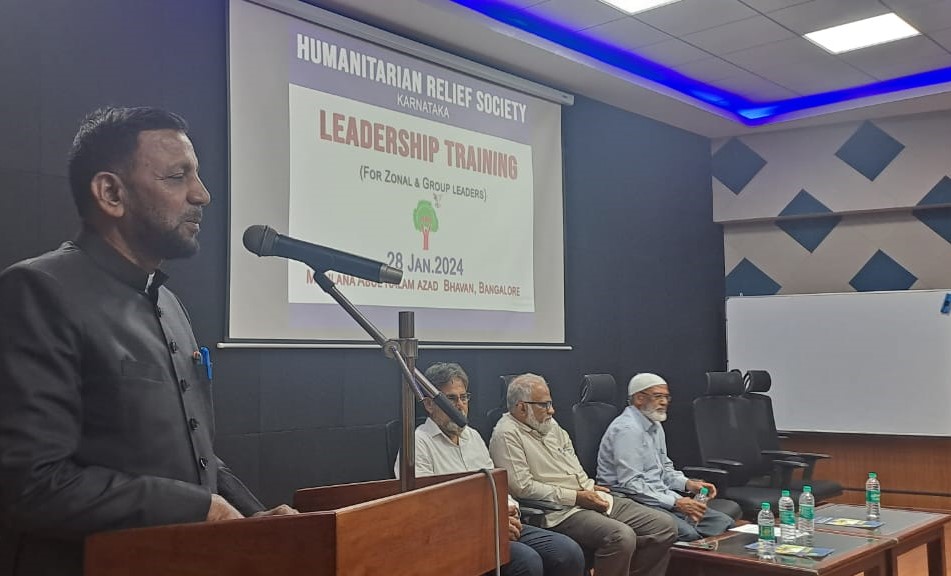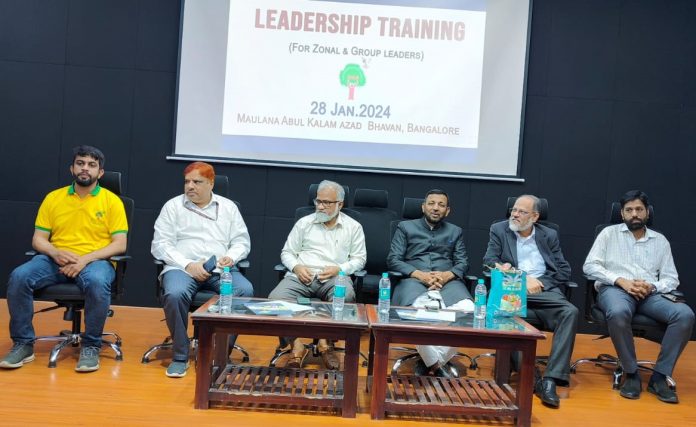Bengaluru, Jan. 30: Be it relief or rehabilitation, victims at remote places usually go unnoticed, and only the easily accessible victims get multiple benefits; this has to be taken care of, said Muhammad Yusuf, Deputy Secretary at Panchayat Raj Commission in Karnataka.
Speaking at a Leadership Training for Zonal and Group leaders of Humanitarian Relief Society (HRS) Karnataka, Mr. Yusuf admired the role played by civil society groups during Covid-19 and highlighted the need of close coordination between government agencies and civil society groups especially during disasters and calamities, in order to help unfortunate victims.
He presented details of Panchayat Raj department’s modus operandi in enriching and empowering rural areas. The Covid Gram Panchayat Task Force (GPTF) formed at gram panchayat level during the pandemic is now a regular GPTF to cater to different emergencies like epidemics, floods, droughts, etc. These comprised elected members of the society and government officials, he said.
Mr. Yusuf further said that at district level there are Disaster Management Committees which map out the areas of disasters and plan the relief work. Hence civil society groups like HRS should have good rapport with these agencies to work effectively. If done independently, the ultimate purpose of relief work won’t be achieved fully, he added.
Milestones
Earlier HRS director K.M. Ashraf presented the milestones set by the organization. He said once 12 districts of North Karnataka were affected by floods and later the same areas were hit by severe drought, HRS was first among the civil society groups to reach out to the victims. The survey conducted by the organization was helpful even to the government agencies in carrying out relief operations.
Similarly, land sliding in Kodagu district caused by heavy rainfall had washed away many residential areas completely and some partially. HRS got into rescue operations immediately and shifted the victims to relief camps where they were stationed for many days. Their houses were repaired and many new houses were constructed by HRS for poor victims. Recently the Ramanagara town, close to Bengaluru, saw worst flood of the time. HRS worked in the affected areas, narrated Mr. Ashraf.
He also explained the relief work conducted at the communally prone coastal town Mangalore in the recent riots. Further, he said apart from Karnataka, the HRS volunteers worked in Tamil Nadu, Kerala, Odissa and Assam floods too.
Covid-19 and the second wave of 2020 have left unforgettable memories of sufferings. HRS was there in different parts of the state with medical aid, blood and plasma donation and community kitchens, especially for migrant workers and even in giving a dignified farewell to deceased persons.
Dr. Syed Kazim, an HRD expert, threw light on leadership qualities and effective management skills and explained how leadership is the art of accomplishing more than the science of management.
To broaden the canvass of the core activities of HRS – Rescue, Relief and Rehabilitation, Dr. Naseem Ahmed explained the various opportunities and avenues in these three domains. Elaborating his points, he narrated the importance of training local communities on disaster preparedness and awareness, especially among the students of vulnerable areas.

The national secretary of Jamaat e Islami Hind, Abdul Jabbar Siddiqi said service to mankind is a language that needs no translation to converse. It not only brings relief to the sufferers but also creates awareness among the well-off section of society about the pains of others and prompts them to help the helpless. Thus human bonds get strengthened and humanness prevails in society. This was the prominent quality of Prophet Muhammad ﷺ which gave him an esteemed identity in society even before attaining the prophethood, he added.
Mr. Siddiqi emphasized that a leader is one who releases the burden of the people, who solves their problems, who foresees the hassles and takes preventive measures to overcome them.
Dr. Belgami Mohammed Sa’d, State President of the Jamaat and former State President Mohammed Atherulla Shariff also spoke on the occasion. Leaders from ten zones and group leaders of HRS across the state attended the program.




